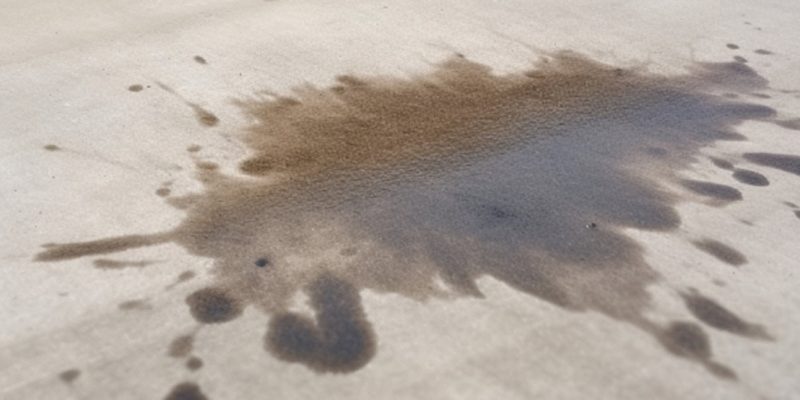Hello, Des Moines homeowners! Today, we’re tackling a common issue many of you face: driveway stains. Whether it’s oil, rust, or tire marks, these blemishes can be a real eyesore. But don’t worry! We’ve got a step-by-step guide to help you get your driveway looking as good as new. Let’s dive in!
What are Driveway Stains?
Driveway stains are like unwelcome guests at a party. They show up uninvited and can be hard to send away. These are the marks and discolorations that appear on your driveway over time, caused by a variety of factors. From the oil that drips from your family car to the rust that sneaks in from nearby metal fixtures, each stain has its own story and, unfortunately, its own stubbornness.
Types of Driveways
Your driveway can be made of different materials, and each reacts to stains a bit differently. Concrete driveways are common and quite absorbent, making them prone to oil and grease stains. Asphalt driveways have their own quirks; they can soften in the hot Iowa sun, making them more susceptible to tire marks and other pressures. Then there’s stamped concrete, a popular choice for its beauty, but it needs a gentle touch when cleaning to avoid damage. Knowing what your driveway is made of is the first step in effectively tackling those pesky stains.
Understanding the nature of driveway stains and the type of driveway you have is crucial in effectively addressing the problem. This knowledge will guide you in choosing the right cleaning methods and products, ensuring that your efforts are both effective and safe for your driveway.
Common Driveway Stains
Oil and Grease Stains
One of the most common villains in the world of driveway stains is oil and grease. These stains are often found right under where cars are parked. Dark and slick, they’re not just unsightly; they can be tough to remove. Oil and grease can seep into the porous surface of concrete, making them a formidable opponent in your cleaning quest.
Rust Stains
Rust stains come from a different source but are no less annoying. These stains usually appear as orange or brown discolorations and are often caused by metal objects like garden tools or car parts left on the driveway. They’re a particular nuisance because they can seep deep into the driveway material, especially if left unattended for too long.
Tire Marks and Rubber
Ever noticed those black streaks on your driveway? Those are tire marks, and they’re more than just dirt. They’re actually rubber that’s transferred from tires to your driveway. These stains are stubborn because the rubber bonds with the surface, especially in hot weather when asphalt driveways become more pliable.
Organic Stains (Leaves, Grass, etc.)
Last but not least, organic stains. These can come from leaves, grass clippings, or berries that fall onto your driveway. While they may seem harmless at first, they can leave behind stubborn stains, especially if they’re not cleaned up promptly. These natural elements can leave tannins and other pigments that soak into your driveway’s surface, leaving an unsightly mark.
Identifying the type of stain you’re dealing with is crucial in choosing the right approach to tackle it. Each type of stain has its own characteristics and requires specific cleaning methods, which we’ll delve into in the next section.
Step-by-Step Stain Removal Methods
General Cleaning Tips
Before you start your stain-fighting mission, it’s important to suit up for the job. Safety is key, so be sure to wear gloves and protective eyewear, especially when working with strong cleaning agents. Start with a clean slate by sweeping away any loose dirt, leaves, or debris from your driveway. This will give you a clear view of the stains and make your cleaning efforts more effective.
Specific Removal Techniques
Oil and Grease Stains: These tough customers call for a strong approach. Apply a degreaser or a solution of dish soap and water directly onto the stain. Let it sit for a while to penetrate and break down the oil. Then, give it a good scrub with a stiff brush. For stubborn stains, you might need to repeat the process a few times. Rinse thoroughly with water when you’re done.
Rust Stains: Rust stains require a bit of finesse. You can use a commercial rust remover, but it’s important to follow the instructions carefully and test it on a small, inconspicuous area first. These products can sometimes discolor your driveway. Gently apply the rust remover, let it work its magic for the recommended time, and then rinse it off.
Tire Marks and Rubber: For these, you’ll need elbow grease and a heavy-duty cleaner. Apply the cleaner to the stains and scrub vigorously with a brush. It might take some effort, but persistence pays off. Once you’ve lifted the stain, rinse the area well with water.
Organic Stains: A solution of dish soap and water is usually effective for these. Scrub the stained area gently with a brush, then rinse with water. For more stubborn organic stains, you can use a mild bleach solution, but be cautious as bleach can discolor some driveway surfaces.
Products and Tools
You don’t need an arsenal of tools, but a few key items will make the job easier. A stiff-bristled brush is essential for scrubbing. For cleaning solutions, look for degreasers, rust removers, and heavy-duty cleaners at your local hardware store. And if you have a large driveway or tough stains, consider renting a pressure washer for more powerful cleaning.
Things to Consider
When you’re waging war against driveway stains in Des Moines, there are a couple of key factors to keep in mind. These considerations ensure not only effective stain removal but also the safety and longevity of your driveway.
Surface Type and Sensitivity
Each driveway material has its own personality and needs. If your driveway is concrete, it’s pretty resilient but can be damaged by harsh chemicals. Asphalt driveways are a bit more sensitive, especially to solvents and oil-based products. And for those of you with stamped concrete driveways, remember they’re the most delicate. Avoid aggressive scrubbing and harsh chemicals to prevent damage to their decorative surface.
Environmental Concerns
We all want to keep our beautiful Iowa environment safe and clean. When choosing cleaning products, consider their environmental impact. Eco-friendly cleaners are not only good for the planet but also safer for pets and kids who play on the driveway. Try to avoid cleaners with harsh chemicals and opt for natural alternatives when possible. Even simple household items like baking soda and vinegar can be surprisingly effective and much kinder to the environment.
Weather and Timing
Believe it or not, the weather can play a big role in your cleaning efforts. A sunny day might seem perfect for outdoor chores, but when cleaning stains, overcast conditions are better. This is because the cleaning solutions won’t evaporate too quickly, giving them more time to work on the stains. Also, consider the time of day. Early morning or late afternoon are ideal times to avoid the strong midday sun.
Water Runoff
Lastly, think about where your cleaning water is going. Water runoff with cleaning chemicals can harm your lawn or garden. Try to use minimal water and redirect the runoff away from green areas. You might even want to block the runoff with sandbags or towels.
By keeping these factors in mind, you’ll not only get rid of those driveway stains but also do it in a way that’s considerate to your driveway material, the environment, and your surroundings.
Preventing Future Stains
A stitch in time saves nine, and the same goes for taking care of your driveway. Preventing stains from setting in the first place can save you a lot of time and effort in the long run. Here’s how you can keep your driveway looking sharp and stain-free.
Regular Maintenance
Regular maintenance is your first line of defense. Sweep your driveway regularly to remove debris, leaves, and dirt that could turn into stains later. If you spot a spill, especially oil or grease, act fast! The sooner you clean it up, the less chance it has to sink in and become a stubborn stain.
Seal the Deal
Applying a sealant to your driveway can be a game-changer. Sealants create a protective barrier on the surface, which helps prevent stains from penetrating. They can also make future cleanups easier and extend the life of your driveway. For concrete driveways, sealing every two to three years is a good rule of thumb. Asphalt driveways benefit from sealing as well, but the frequency depends on the climate and the amount of vehicle traffic.
Mindful Usage
Be mindful of what happens on your driveway. Small changes in how you use your driveway can make a big difference. For instance, try to avoid parking leaky vehicles on the driveway and keep metal objects, which can rust, away from the surface. If you’re doing any DIY projects, lay down a protective sheet to catch any spills.
Choose the Right Materials
If you’re installing a new driveway or thinking about redoing your current one, choosing the right materials can make a big difference in stain resistance. Some materials are more stain-resistant than others, so do your research or talk to a local contractor about the best options for your needs and budget.
TIP
By adopting these preventive measures, you can keep your driveway looking great for years to come, reducing the need for frequent deep cleaning and enhancing your home’s curb appeal.
Other Concerns
While tackling driveway stains is crucial, there are other concerns you should also be aware of to maintain the overall health and appearance of your driveway. Addressing these can prevent future problems and ensure your driveway remains in top condition.
Addressing Cracks and Damage
As you clean your driveway, keep an eye out for any cracks or damage. These can be more than just cosmetic issues. Cracks can allow water to seep in, leading to more serious problems like erosion or freeze-thaw damage, especially during our Iowa winters. Small cracks can be filled and repaired relatively easily, but larger or more complex damage might require professional attention. Regularly checking and addressing these issues can prevent minor problems from turning into expensive repairs.
Professional Cleaning Services
Sometimes, despite your best efforts, a stain might be too stubborn, or you might not have the time or resources to remove concrete stains yourself. That’s where professional cleaning services come in. These experts have the tools and know-how to effectively remove even the most challenging stains. They can also offer advice on sealants and regular maintenance. While it’s an additional expense, professional cleaning can be a worthwhile investment, especially for extensive or difficult-to-remove stains.
Long-Term Care and Upkeep
Maintaining your driveway is an ongoing task. Regular cleaning, repairing damage as soon as it’s spotted, and resealing when necessary can extend the life of your driveway. This not only keeps it looking great but also adds to the value of your home. Consider setting a schedule for routine maintenance tasks to ensure that your driveway always gets the care it needs.
By addressing these additional concerns, you’re not just cleaning your driveway; you’re preserving it. A well-maintained driveway enhances the curb appeal of your home and can save you money in the long run by preventing more severe damage.
Conclusion
Congratulations, you’re now well-equipped to tackle those pesky driveway stains! From understanding the types of stains to learning how to effectively remove them, you’ve gained valuable knowledge that will not only enhance the look of your driveway but also extend its lifespan. Remember, regular maintenance and prompt action on spills and damage can make a world of difference.

